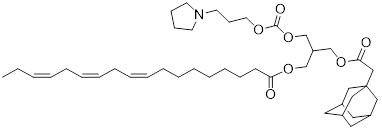Oleoyl LPA, 18:1 LPA is a species of lysophosphatidic acid containing oleic acid at the sn-1 position and is the most potent LPA analog for calcium release. Lysophosphatidic Acid (LPA) is a small lysophospholipid involved in diverse cellular processes such as cell proliferation, chemotaxis, platelet aggregation, wound healing, angiogenesis, tumor invasion, and smooth muscle contraction. LPA binds to several G-coupled protein receptors to initiate its biological functions. In cancer, LPA primarily promotes cell survival, migration and invasion. May contain up to 15% of the 2-acyl isomer due to acyl transfer.
Product Number: L-0181
Oleoyl LPA, 18:1 LPA
Oleoyl LPA, 18:1 LPA is a species of lysophosphatidic acid containing oleic acid at the sn-1 position and is the most potent LPA analog for calcium release. [Read More...]




